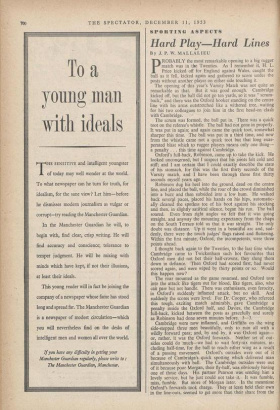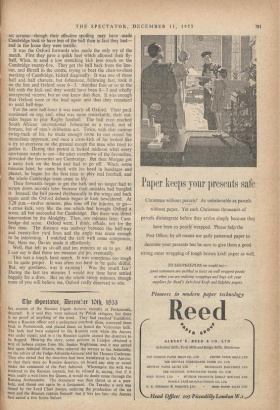SPORTING ASPECTS
Hard Play Hard Lines
By J. P. W. MALLALIEU pROBABLY the most remarkable opening to a big rugger match was in the Twenties. As I remember it, H. L. Price kicked off for England against Wales, caught the ball as it fell, kicked again and gathered to score under the posts without another player on either side touching it. The opening of this year's Varsity Match was not quite as remarkable as that. But it was good enough. Cambridge kicked off, but the ball did not go ten yards, so it was " scrum- back," and there was the Oxford hooker standing on the centre line with his arms outstretched like a withered tree, .waiting for his two colleagues to join him in the first head-on clash with Cambridge. The scrum was formed, the ball put in. There was a quick toot on the referee's whistle. The ball had not gone in properly. It was put in again; and again came the quick toot, somewhat sharper this time. The ball was put in a third time, and now from the whistle came not a quick toot but that long exas- perated blast which to rugger players means only one thing— a penalty . . . this time against Cambridge.
Oxford's full-back, Robinson, came up to take the kick. He looked unconcerned, but I suspect that his joints felt cold and stiff; and I am certain that I could exactly describe the state of his stomach, for this was the first thirty seconds of the Varsity match, and I have been through those first thirty seconds myself years ago. Robinson dug his heel into the ground, dead on the centre line, and placed the ball, while the roar of the crowd diminished into a buzz and then subsided into a low hum. He walked back sever#1 paces, placed his hands on his hips, automatic- ally cleaned the spotless toe of his boot against his stocking and then, in slightly satirical silence, began his run. The ball soared. Even from right angles we felt that it was going straight, and anyway the mounting expectancy from the chaps on the South Terrace told us that it was straight. The only doubt was distance. Up it went in a beautiful arc and, sud- denly, there were the touch judges' flags raised and fluttering. Within the first minute, Oxford, the incompetents, were three points ahead.
I thought back again to the Twenties, to the last time when Cambridge came to Twickenham such hot favourites that Oxford men did not bet their half-crowns, they slung them down in defiance. Then Oxford had scored first, had never scored again, and were wiped by thirty points or so. Would this happen now? The roar mounted as the game resumed, and Oxford tore into the attack like tigers out for blood, like tigers, also, who can paw but not handle. There was enthusiasm, even ferocity, in Oxford's suddenly inflamed attack, but no skill. And suddenly the scores were level. For Dr. Cooper, who refereed this tough, exciting match admirably, gave Cambridge a penalty inside the Oxford half, and Davies, the Cambridge full-back, kicked between the posts as gracefully and surely as Robinson had done seven minutes before. 3-3.
Cambridge were now inflamed, and Griffiths on the wing side-stepped three men beautifully, only to ruin all with a wildly forward pass; and, by and by, it was Oxford again— or, rather, it was the Oxford forwards. Neither set of out- sides could do much—we had to wait forty-six minutes, in- cluding half-time, for the ball to reach either wing as a result of a passing movement. Oxford's outsides were out of it because of Cambridge's quick spotting which delivered man simultaneously with baIl. The Cambridge outsides were out of it because poor Morgan, their fly-half, was obviously having one of those days. His partner Pearson was sending him a lovely service, but he just could not take it. It was fumble, miss, fumble. But more of Morgan later. In the meantime Oxford's forwards took charge. They at least held their own in the line-outs, seemed to get more than their share from the set scrums—though their effective spoiling may have made Cambridge look to have less of the ball than in fact they had— and in the loose they were terrific. It was the Oxford forwards who made the only try of the match. First they gave a quick heel which allowed their fly- half, Winn, to send a low stretching kick into touch on the Cambridge twenty-five. They got the ball back from the line- out, and Birrell in the centre, trying to beat the chest-to-chest marking of Cambridge, kicked diagonally. It was one of those half and half chances, but Johnstone, following fast, took it on the line and Oxford were 6-3. Another foot or so to the left with the kick and they would have been 8-3 and wholly unexpected victors; but no one knew that then. It was enough that Oxford were in the lead again and that they remained so until half-time.
For the next half-hour it was nearly all Oxford. Their pack continued on top, and, what was more remarkable, their out- sides began to play Rugby football. The ball even reached South African international Johnstone as a result, not of fortune, but of man's deliberate act. Twice, with that curious swing-back of his, he made enough • room to run round his immediate opponent, and once a cross-kick of his looked like a try to everyone on the ground except the man who tried to gather it. During this period it looked odds-on what every sportsman wants to see—the utter overthrow of the favourites, provided the favourites are Cambridge. But then Morgan got a nasty kick on the head and had to go off. When, some minutes later, he came back with his head in bandages and plaster, he began for the first time to play real football, and the whole Cambridge team came to life.
Their forwards began to get the ball, and no longer had to scrum down seconds later because their outsides had bungled it. instead, the ball passed rhythmically to the wings and back again until the Oxford defence began to look bewildered. At 3.28 p.m.—twelve minutes, plus time off for injuries, to go— a cross kick, very like the one which had brought Oxford a score, all but succeeded for Cambridge. But there was direct intervention by the Almighty. Then, two minutes later, Cam- bridge did score. Oxford were, I think, offside, not for the first time. The distance was midway between the half-way and twenty-five yard lines and the angle was acute enough to be interesting. I watched the kick with some composure, but, bless me, Davies made it effortlessly.
Well, that left us six-all and ten minutes or so to go. All I can say is that those ten minutes did go, eventually.
This was a tough, hard match. It was sometimes too tough to be quite. proper. It was often too hard to be quite skilful. But, my goodness, was it exciting! Was the result fair? During the last ten minutes I would any time have settled happily for a draw. But on the whole ninety minutes, though none of you will believe me, Oxford really deserved to win.



































 Previous page
Previous page